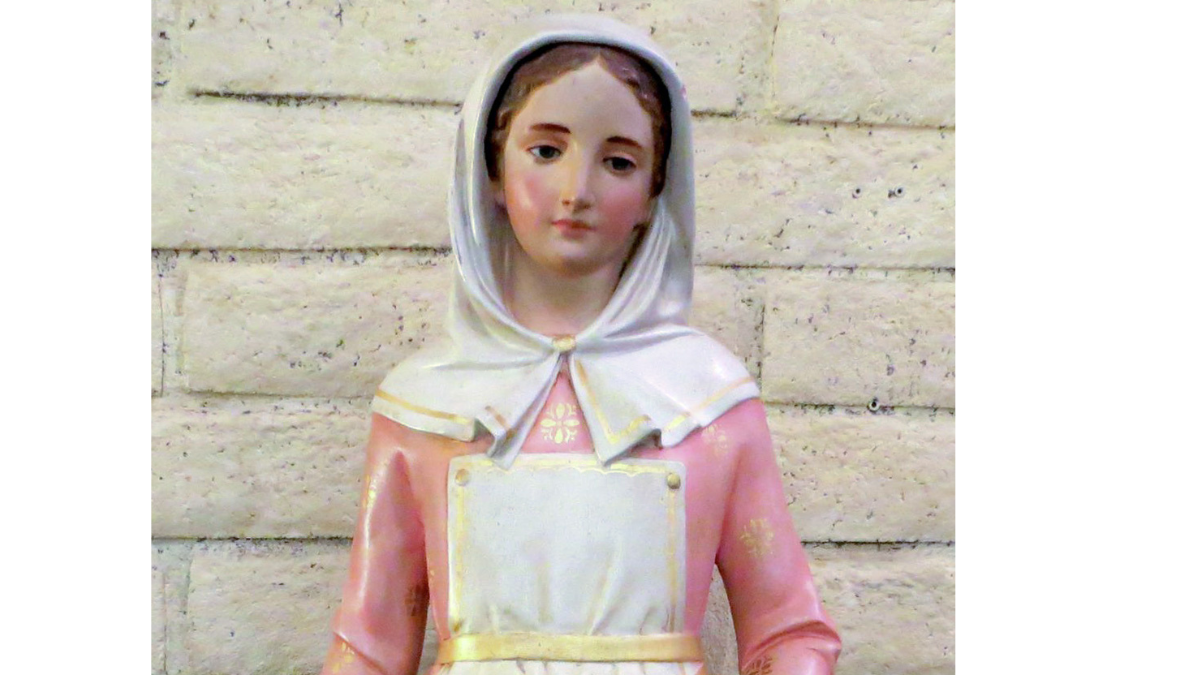
 Add to favorites
Add to favoritesSt. Germaine Cousin
| Feast day | September 25 |
| Patron | of Cork, Diocese of Cork |
| Birth | 550 |
| Death | 620 |
When Hortense decided to marry Laurent Cousin in Pibrac, France, it was not out of love for his infant daughter. St. Germaine was everything Hortense despised. Weak and ill, the girl had also been born with a right hand that was deformed and paralyzed. Hortense replaced the love that Germaine has lost when her mother died with cruelty and abuse.
Laurent, who had a weak character, pretended not to notice that Germaine had been given so little food that she had learned to crawl in order to get to the dog’s dish. He wasn’t there to protect her when Hortense left Germaine in a drain while she cared for chickens — and forgot her for three days. He didn’t even interfere when Hortense poured boiling water on Germaine’s legs.
With this kind of treatment, it’s no surprise that Germaine became even more ill. She came down with a disease known as scrofula, a kind of tuberculosis that causes the neck glands to swell up. Sores began to appear on her neck and in her weakened condition to fell prey to every disease that came along. Instead of awakening Hortense’s pity this only made her despise Germaine more for being even uglier in her eyes.
Germaine found no sympathy and love with her siblings. Watching their mother’s treatment of their half-sister, they learned how to despise and torment her, putting ashes in her food and pitch in her clothes. Their mother found this very entertaining.
Hortense did finally get concerned about Germaine’s sickness — because she was afraid her own children would catch it. So she made Germaine sleep out in the barn. The only warmth Germaine had on frozen winter nights was the woolly sheep who slept there too. The only food she had were the scraps Hortense might remember to throw her way.
The abuse of Germaine tears at our hearts and causes us to cry for pity and justice. But it was Germaine’s response to that abuse and her cruel life that wins our awe and veneration.
Germaine was soon entrusted with the sheep. No one expected her to have any use for education so she spent long days in the field tending the sheep. Instead of being lonely, she found a friend in God. She didn’t know any theology and only the basics of the faith that she learned the catechism. But she had a rosary made of knots in string and her very simple prayers: “Dear God, please don’t let me be too hungry or too thirsty. Help me to please my mother. And help me to please you.” Out of that simple faith, grew a profound holiness and a deep trust of God.
And she had the most important prayer of all — the Mass. Every day, without fail, she would leave her sheep in God’s care and go to Mass. Villagers wondered that the sheep weren’t attacked by the wolves in the woods when she left but God’s protection never failed her. One day when the rains had swollen the river to flood stage, a villager saw the river part so that she could cross to get to the church in time for Mass.
No matter how little Germaine had, she shared it with others. Her scraps of food were given to beggars. Her life of prayer became stories of God that entranced the village children.
But most startling of all was the forgiveness to showed to the woman who deserved her hatred.
Hortense, furious at the stories about her daughter’s holiness, waited only to catch her doing wrong. One cold winter day, after throwing out a beggar that Germaine had let sleep in the barn, Hortense caught Germaine carrying something bundled up in her apron. Certain that Germaine had stolen bread to feed the beggar, she began to chase and scream at the child. As she began to beat her, Germaine opened her apron. Out tumbled what she had been hiding in her apron — bright beautiful flowers that no one had expected to see for months. Where had she found the vibrant blossoms in the middle of the ice and snow? There was only one answer and Germaine gave it herself, when she handed a flower to her mother and said, “Please accept this flower, Mother. God sends it to you in sign of his forgiveness.”
As the whole village began to talk about this holy child, even Hortense began to soften her feelings toward her. She even invited Germaine back to the house but Germaine had become used to her straw bed and continued to sleep in it. There she was found dead at the age of 22, overcome by a life of suffering.
With all the evidence of her holiness, her life was too simple and hidden to mean much beyond her tiny village — until God brought it too light again. When her body was exhumed forty years later, it was found to be undecayed, what is known as incorruptible. As is often the case with incorruptible bodies of saints, God chooses not the outwardly beautiful to preserve but those that others despised as ugly and weak. It’s as if God is saying in this miracle that human ideas of beauty are not his. To him, no one was more beautiful than this humble lonely young woman.
After her body was found in this state, the villagers started to speak again of what she had been like and what she had done. Soon miracles were attributed to her intercession and the clamor for her canonization began.
In this way, the most unlikely of saints became recognized by the Church. She didn’t found a religious order. She didn’t reach a high Church post. She didn’t write books or teach at universities. She didn’t go to foreign lands as a missionary or convert thousands. What she did was live a life devoted to God and her neighbor no matter what happened to her. And that is all God asks.
In Her Footsteps:
Do you make excuses not to help others because you have so little yourself? Share something this week with those in need that may be painful for you to give up.
Prayer: Saint Germaine, watch over those children who suffer abuse as you did. Help us to give them the love and protection you only got from God. Give us the courage to speak out against abuse when we know of it. Help us to forgive those who abuse the way you did, without sacrificing the lives of the children who need help. Amen.
Views: 3


